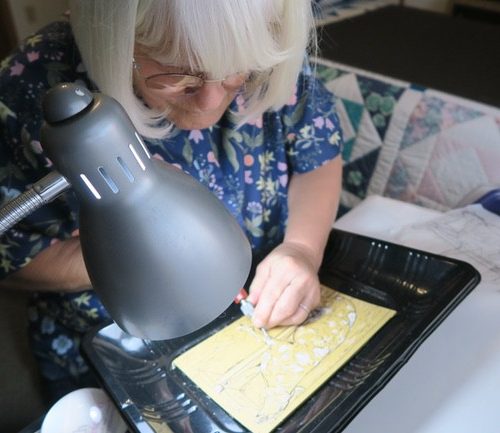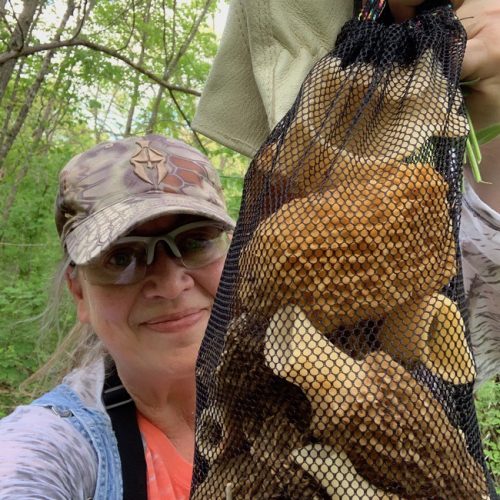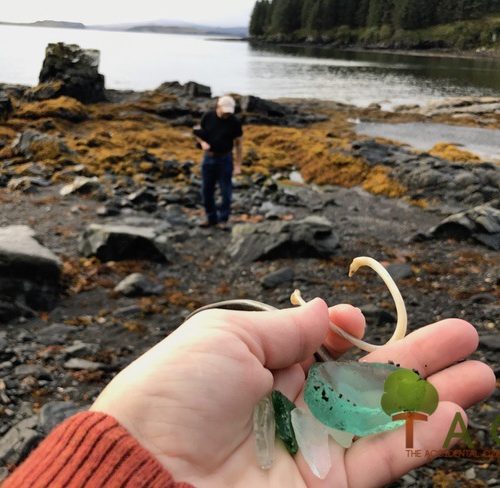In December 2002, I had the privilege of visiting with Rolla resident Grace Grahl, who at that time was 101. In this 3-part story of her life, she talks about life as she knew it. Some of it is undoubtedly politically incorrect, but it’s true and not been altered. I titled it “A Century of Christmases,” because she was born on Christmas Day.~BB
In 1901 Queen Victoria died, William McKinley was assassinated, and Theodore Roosevelt became president of the United States. Meanwhile, Guglielmo Marconi received wireless signals sent from England to Newfoundland, and the Eastern Orthodox Church excommunicated Leo Tolstoy.
In the desolate southeastern plains of Colorado, on December 25, 1901, Grace Grahl (nee Phillips) was born in a place called Rocky Ford. This year she’ll celebrate her 101st Christmas – at home in Rolla with her daughter and son-in-law, Marion and Joe Kearse.
In a recent visit with Mrs. Grahl, I sat and listened to her talk about her life, which she relates in “stories.” With her background as a schoolteacher and artist, the stories come naturally and with a flair that few folks of any age seem to possess.
A petite, well-coiffed woman, wearing a lovely shade of blue (her favorite color), she made her life come alive through tales of trials and jubilation. Her eyes sometimes became misty with sorrow, and other times, they lit up with happiness.
A Century of Christmases, Part 1
Throughout the many years, Mrs. Grahl has told these stories to her children and grandchildren, great grandchildren and great-great grandchildren. At this holiday season, I’m privileged to have met Mrs. Grahl and to be able to pass along some tales from her rich life.
“I’ll begin with the Indian Story, my children like to hear that, and this is all before I was four-years old. I saw a big blue blob, and I watched it come up near the house … like a blue blanket, but when it came up close to the house it divided in two … I must have been sitting on the doorstep … I ran into the house and I saw my father with a gun in his hand, and my mother was crying and pleading with him, … and crying ‘Oh, don’t do that. They might come back and do something bad to us … Let them take the apples.’
“I was told later in my life that those were two Indians and they took some apples from under this tree that grew in this desolate place. Often years later, I wondered, could that apple tree have been planted by Johnny Appleseed, because he did go through the countryside, so history tells us, and he planted apple seeds along the way. And they picked up some apples and ate them and walked on and that’s all there is to this story.
“ My father was going to scare them, he wasn’t going to shoot them.
“My mother used to take me out and show me ant hills and they seemed to be about as tall as I was. And my mother showed me some big red ants, and said, ‘Don’t let these bite you, they’ll hurt!’
“My mother taught school. She and I played school together because I remember this green sheet of paper, and another one just like it, and on one it said ‘God’ and the other said ‘Good.’ … There’s where I learned where God is good, and I wasn’t afraid anymore.
“Shortly after that, she called me to her bedside, and I had to climb up, because I was just a little girl, less than four-years old, and she put her arm around me and said, ‘Grace, I’m going to leave you for a little while, but God will take care of you [At this point, Mrs. Grahl’s voice broke as she related the story.].’
“I remember my father took me one day shortly after that to a room where she was laid on two tables … and she had her blue dress on, and that was her good dress, … and he took me by the hand and showed me. And I asked, ‘Who put her there?’ and he said, ‘God.’ And I was satisfied that was why she was there.
“That’s the end of my story in Colorado.”
Next week’s column will feature Mrs. Grahl’s stories about reading the newspaper account of the sinking of the Titanic, going to a special barn dance, and driving a Model-T. She will also talk about the differences between people then and now …
A Century of Christmases, Part 2
101 years of counting and recounting …
This is a continuation of last week’s column featuring the life of Grace Grahl, who recently celebrated her 101st birthday on Christmas Day. She recalled moving from Rocky Ford, Colo., to Council Bluffs, Iowa, when she was four-years old, after the death of her mother. Her father left her and her little brother, Dick, with her grandfather and her Aunts Mary and Sophie.
“After we got to Grandpa’s house, it began to pour down rain. In Rocky Ford, Colo., since it’s a dry country, I’d never seen anything like that … and I went to the window to cry, and a voice behind me said, ‘What are you crying for?’ and I said, ‘Because my mama can’t get in,’ … it was raining so bad and I thought it was raining in Colorado, too.
“Between the aunts and Grandpa, we managed. He [father] left us there at our grandfather’s house, but I never heard from him again. I think Aunt Mary did, because – I was kind of a sneaky little girl – things were going on around me that I wasn’t supposed to see or talk about, but I saw what was happening.
“One time, Aunt Mary showed us a chamois skin bag on her corset, and in that bag she seemed to have a whole handful of gold coins. She showed them to Dick and I, and she never told us where they came from. As years have gone by, I just know that Aunt Mary got those from my father. And one time, I asked her what my father did and her words were, ‘He was a gambler.’
“She had enough of those gold pieces there, that it wasn’t long … she bought a very nice house in Council Bluffs, Iowa, there, at 1517 Madison Avenue …We didn’t have water, but we did have electric lights.
“We lived with Aunt Mary then. She was a schoolteacher out in the boondocks, a very fine teacher – what I mean is very strict. In fact I couldn’t talk with her and not use very good English … I was never cold, I was never hungry and I was never dirty, but boy I had to be perfect.
“We didn’t have very many Christmases … Aunt Mary told my brother, Dick, and I that we were not supposed to go in the other [upstairs] room and look, and we didn’t. The next morning, on the dining room table there was a bare tree branch full of all kinds of nuts. Now, what could be nicer than that? Then she took us in the front room and there was another tree [bare branch] there with all kinds of candy hanging on it – canes and just everything. Those were our Christmas trees!
“When I was ten-years old … We didn’t have radio, we didn’t have television, we didn’t even have a telephone. The only news we got was through the newspaper … and I saw all the grown-up people scramble for that newspaper – they had to get it right quick – to find out what happened to the Titanic. I said I was going to get the newspaper and so I could see. Sure enough, I saw the picture of the Titanic, and underneath, I read all of these words.
“I could just read what was said and done. I knew how they were loading the lifeboats, and I knew there weren’t near enough lifeboats to hold all the people, so the paper said. And the band was still playing as the ship was sinking, and sure enough, after I read on about how the ship was made to withstand any iceberg that came along, and it could do anything that no other ship could do, and I knew it was sinking right while they were writing that … and I could read it when I was ten-years old. I was so happy to know that I could read the paper.
*******
Stories and more stories filled the space of an afternoon. Mrs. Grahl talked about Prohibition and said, “Nobody ever stopped Grandpa … those people in Council Bluffs, they liked Grandpa’s wine so much that no one ever reported him.” Her grandfather kept the wine beneath a trapdoor in the kitchen.
She said, “I sat with the ladies, and they liked me because I was just a little girl. Grandpa filled all our glasses, and he didn’t know I didn’t need that much wine … Well, I was pretty young, maybe eleven or twelve.”
Mrs. Grahl snuck back to Aunt Mary’s house, drunk and running a stick along every picket fence along the way. Although she doesn’t believe that her Aunt Mary ever found out that she had been drinking, she does know that Aunt Mary tired of having her around. One day, when Grace was a teenager, Aunt Mary said, “Now I don’t want you here when I get home.”
Next week, you’ll find out where Mrs. Grahl went and what she did with her life.
A Century of Christmases, Part 3
Grace Grahl: All my life … things turned over to the good
This is the third, and last, column in a series about Grace Grahl, a local woman who recently celebrated her 101st birthday. It starts in about 1916.
One day, as Mrs. Grahl’s guardian, Mary, left to teach school, she turned back at the door, looked at Grace, and said, “Now I don’t want you here when I get home.”
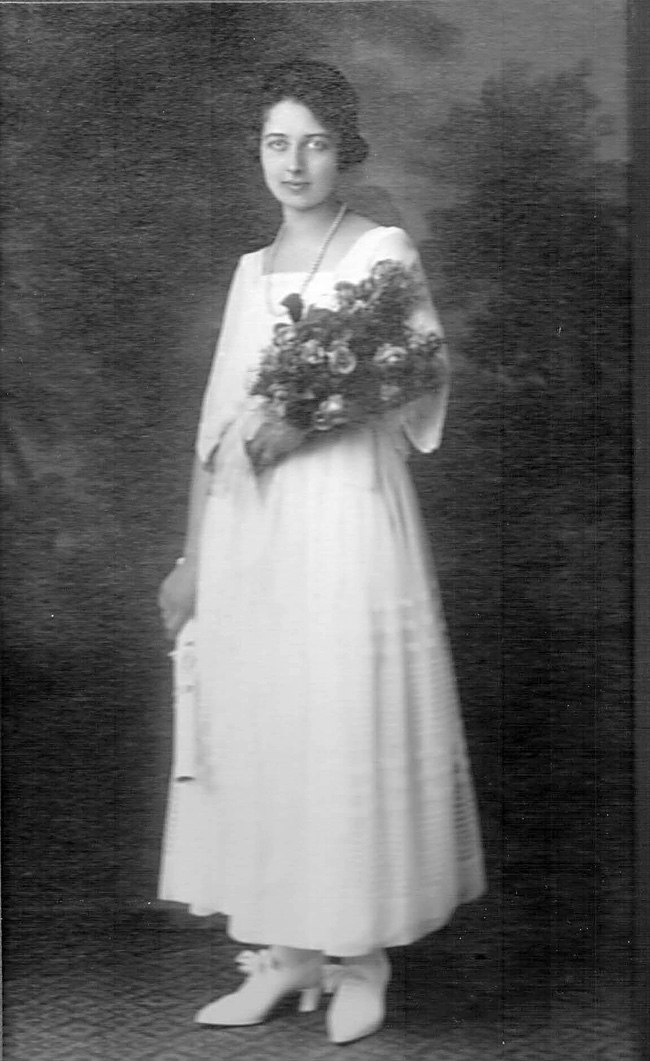
Only a freshman in high school, Grace took her aunt’s words to heart, picked up her few belongings and went to the local YWCA to see if she could stay there. She was told about a family in Council Bluffs who needed a nanny. She stayed with them for four or five years, before becoming a schoolteacher at the Keg Creek #2 Country School, where she taught eight grades.
During the course of the interview, Mrs. Grahl related more stories from her patchwork quilt of life, starting with the first night she stayed with her new family.
“I’d never done it, but I took care of that little baby all night … the kitchen had a great big storeroom, and there was a cot in there and she [the baby’s mother] said ‘You can stay in there,’ and I stayed there for four or five years with the McBains, and they liked me and I was just one of the family and I had the run of the house.
“I was a schoolteacher [in the early 1920s] and I used to enjoy collecting what the children wrote and making them into better words … Oh, I loved being a school teacher … I liked the little children, to see them learn, to finally learn to do something.
“I did get my certificate so I could teach in this little town north of Council Bluffs, Bentley, and they wanted a teacher who could teach Manual Training to three or four of the big boys … so I said I’ll go to summer school so I can learn how to teach them. So I took a course in Manual Training and I passed … Girls could’ve come in to take the class, but they never asked to come in.
Mrs. Grahl met her future husband, Carl, at a barn dance. According to her, their eyes locked across the room, and then, they had “dates after dates.”
“Neither Carl nor I had a lot of money, so we just got married [in 1925]… it was very, very, very simple …After I married Carl, we were on this farm and we were happy … A man couldn’t be better to his wife.
“When I first began to get out and around and about, we drove Model T’s. Carl had a Model T, and he needed something in Omaha one time, and I was a young bride with a young baby boy. I had to wrap him [the baby] in a blanket and lay him by my feet. First of all, Carl had to crank the car and then he apologized to me, and he said, ‘The next time you get in, you’ll have a starter’… and he did, he made it himself.”
“Now, we did have a little radio, right at the beginning and my husband made our little radio … and to tune it in, that was the trick! We had a little cat whisker in one hand and a little metal [in the other] and we had to tune those in together, and we’d hear somebody out in the world … the Omaha Stock market, because my husband was interested in hearing that sort of thing.”
Throughout the interviews, Mrs. Grahl would interject, “That’s the way it was, and we were happy. We got by.”
“My favorite president was Harry S Truman, and I remember where his land lay, and it wasn’t far from where we lived … he was just a little old country boy … and he was just so homey and comfortable … I loved the way he flipped his cane when he was walking.”
Mrs. Grahl filled her years with raising her four children, and with artistic endeavors, such as painting china, dolls and beautiful landscape scenes. She was proficient with tatting needles, too. To this day, she continues to create children’s poems and stories – and the stories are told from a dog’s point of view.
Mrs. Grahl pondered the question I posed to her about how people have changed over the past century. Her answer: “It comes so gradually, you hardly know. We’re more giving today than we were back then, of ourselves and of our ownings, too. Yes, I would say we’re much more giving.”
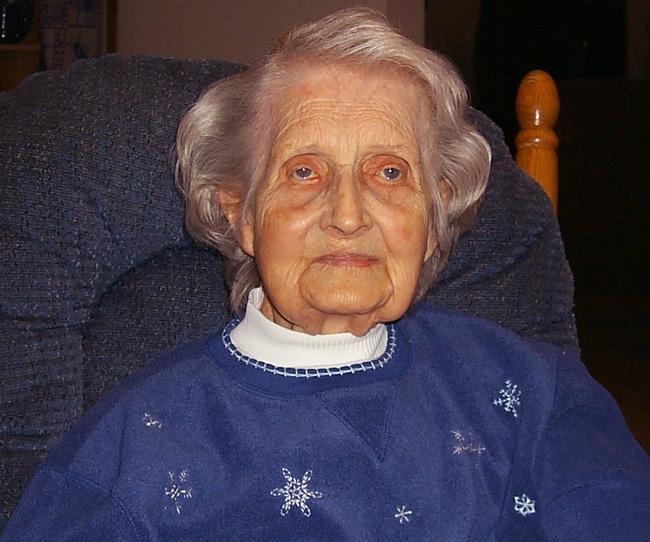 Her advice to us? “Be positive, that’s the word. Be positive! Make use of your positive life … All my life, I want you to know, how things turned over to the good – always to my benefit, and I didn’t ask for it.”
Her advice to us? “Be positive, that’s the word. Be positive! Make use of your positive life … All my life, I want you to know, how things turned over to the good – always to my benefit, and I didn’t ask for it.”

